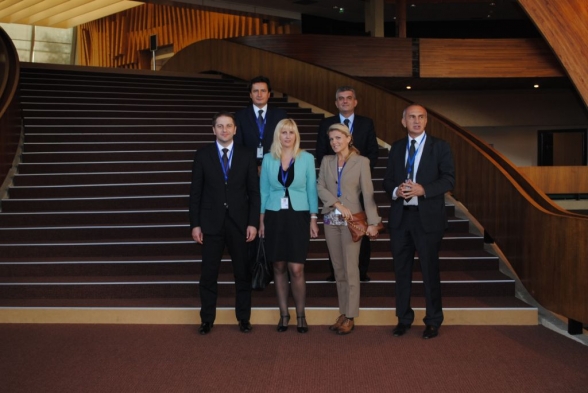In his address to the Parliamentary Assembly, in which he also made reference to Serbia’s EU integration process, Present Nikolić highlighted Serbia’s achievements to date in advancing legal and political reforms since joining the Council of Europe 10 years ago. President Nikolić also pointed to positive developments in the dialogue between Belgrade and Pristina, and the fight against corruption and organised crime, stating that Serbia was aspiring to be a respectable member of the European family of nations, for the benefit of its people.
Parliamentary Assembly of the Council of Europe considered topics included in the agenda under urgent procedure “The Situation in Syria” and “EU and Council of Europe human rights agendas: synergies not duplication”
During the discussion on Syria, the PACE welcomed the plan for eliminating Syria chemical weapon. In the Resolution adopted unanimously, the Assembly insists perpetrators of all crimes against humanity in Syria to be brought to justice – including the International Criminal Court if necessary. The Assembly wholeheartedly backed efforts to institute a ceasefire and the organisation of a peace conference in Geneva, calling on Council of Europe member states to “support the emergence of a democratic, inclusive and stable state in Syria respectful of human rights”.
Within the discussion on European Union and Council of Europe Programmes in the human rights field, MPs of the Parliamentary Assembly of the Council of Europe assessed that the European Union should explore possibility of strategic actions together with the Council of Europe prior to establishing new structures for human rights. PACE emphasised that European Union member states should continue to use expertise of the Council of Europe and accelerate joining process to the European Convention on Human Rights. The Assembly pointed out that higher standards and better protection of human rights were always welcomed, but establishment of parallel structures would create double standards and possibilities which would brought to, inter alia, waste of money. Countries which are members of both bodies should use their influence to “minimise duplication and maximise synergies” in the field of human rights protections, the parliamentarians said.
During the afternoon session, discussion was held on persons missed during European conflicts and food safety as well.
Parliamentary Assembly of the Council of Europe emphasises that the delay in investigating the fate of 20 000 missing persons in Europe following a number of armed conflicts hampers the reconciliation between former conflicting parties. The Assembly called on European states to provide proper care and support to families of missing persons, underlining that families have the right to know what has happened to their loved ones. The Assembly considers that there is a strong need for European governments to speed up the process of the exhumation and identification of the remains of missing persons, and to bring the truth of their fate to family and friends. The non-resolution of this problem is a potential danger for European security.
During the day, PACE parliamentarians spoke on both quantitative and qualitative aspects of food safety, calling on member states to strengthen food controls and to support independent research on emerging risks for food safety.Regarding access to food, the Assembly recommends that member States increase funds for development of agriculture and strengthen solidarity mechanisms to combat poverty. In the Resolution adopted on the basis of the report by Mr Fernand Boden, PACE also stressed the importance of implementing the fundamental right to sufficient and safe food.
On fourth working day, meetings of the following committees were held: Committee on Migration, Refugees and Displaced Persons, Committee on Culture, Science, Education and Media, Committee on Social Affairs, Health and Sustainable Development, Committee on Political Affairs and Democracy, Committee on Culture, Committee on Equality and Non-Discrimination, Foreign Affairs Sub-Committee, Sub-Committee on Co-operation with non-European countries of origin and transit: these were attended by members i.e. deputy members of the Delegation of the Parliament of Montenegro to the PACE.
On the last day of the PACE Autumn Session, the discussion will be held on Combating discrimination against older persons on the labour market and Strengthening the institution of Ombudsman in Europe.
Delegation of the Parliament of Montenegro participating in the work of the Parliamentary Assembly of the Council of Europe composes of: Head of the Delegation Mr Zoran Vukčević, PhD and members of the Delegation Ms Draginja Vuksanović, PhD, Mr Mladen Bojanić, Mr Predrag Sekulić, PhD, Mr Damir Šehović, MA and Ms Snežana Jonica








